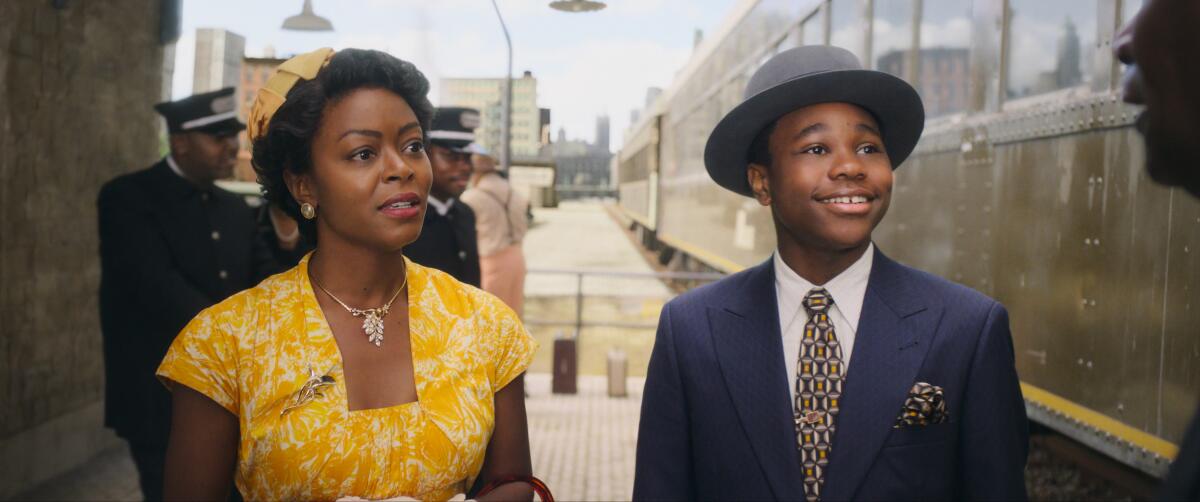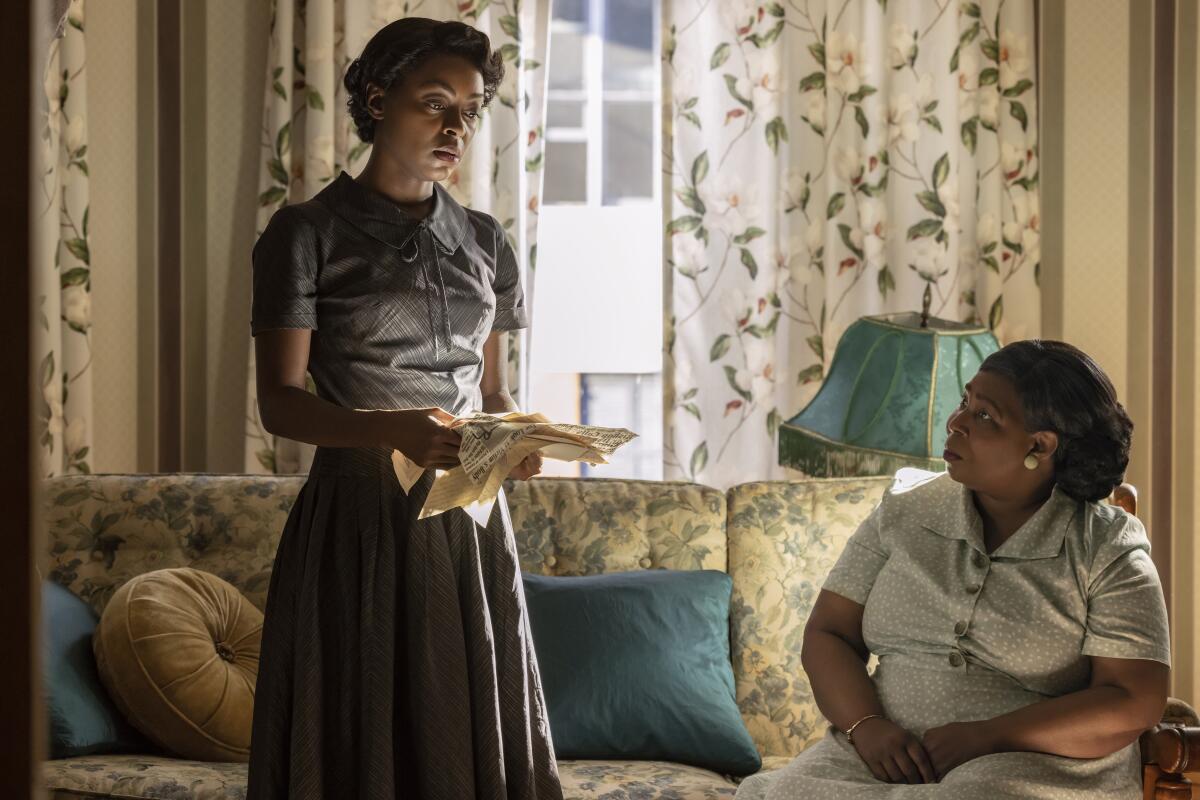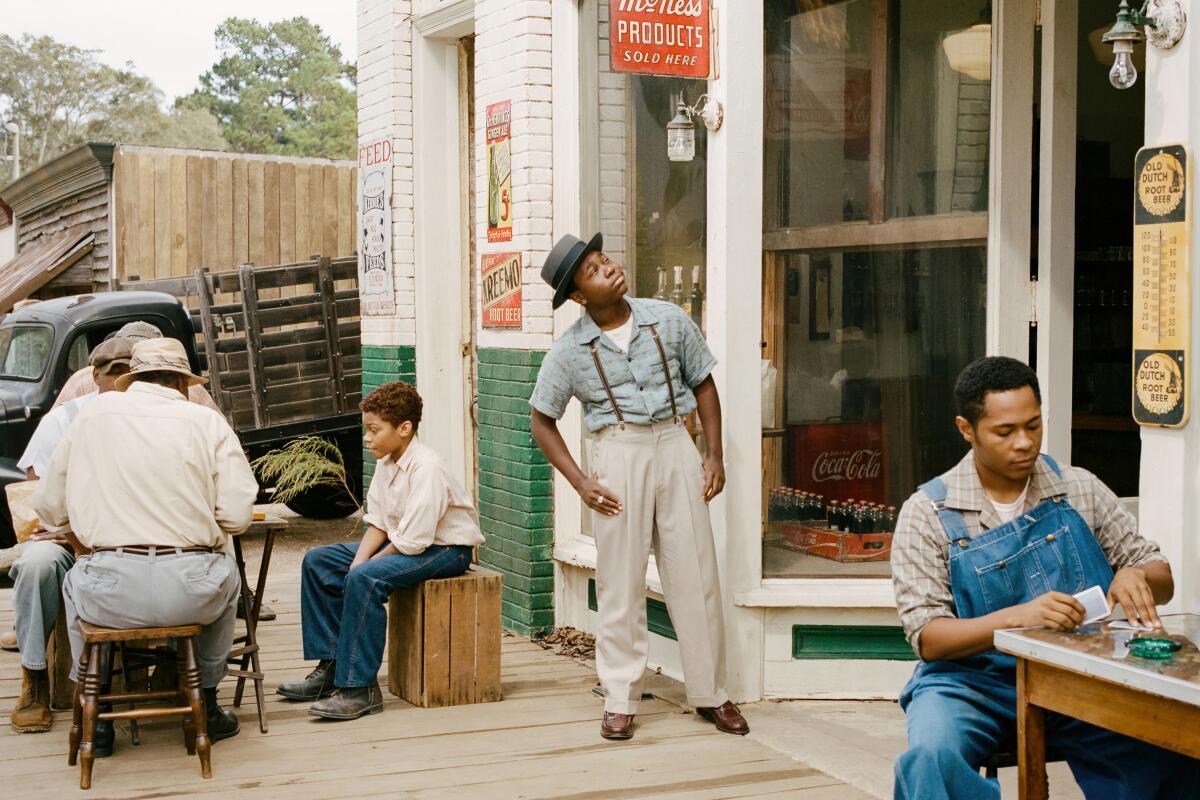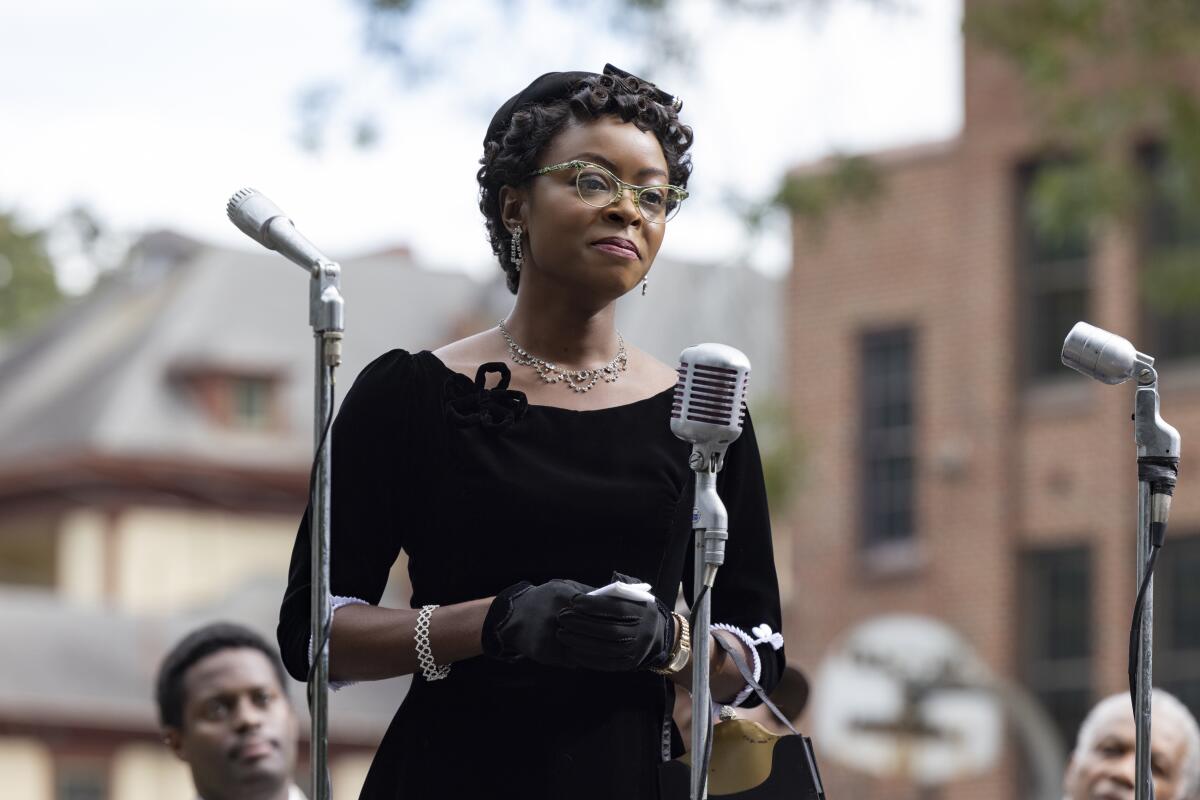Review: Danielle Deadwyler’s performance holds you through the tragedy and injustice of ‘Till’

- Share via
The opening shot of “Till” tells a wrenching story in miniature. On a bright day in 1955, Mamie Till-Mobley (Danielle Deadwyler) drives her son, Emmett (Jalyn Hall), to a department store in Chicago, hoping to pick up a few things before his upcoming trip to see their relatives down in Mississippi. The mood is festive — Emmett is an infectiously high-spirited kid — but as the camera pans across the inside of the car, from mother to son to mother again, an unmistakable change comes over Mamie, stealing away her smile and clouding her face with worry. Deadwyler, an actor of rare expressive subtlety, projects an air of foreboding that merges with ours, as if she were quietly dreading something we already know.
Almost every biographical drama depends on a measure of audience familiarity with its real-life subject. The public’s awareness of Emmett Till, a 14-year-old Black boy whose abduction, torture and murder by two Mississippi white men became one of the cornerstone tragedies of the civil rights movement, is one reason this thoughtful, somber movie exists. It may also explain why “Till” — arriving, like this year’s newly signed Emmett Till Antilynching Act, nearly 70 years after the events in question — has generated perhaps more than its fair share of advance trepidation. Given that this agonizing, emblematically American story has already been memorialized in books, plays, songs, poems and documentaries — and given the sheer number of films and TV shows that claim to illuminate Black trauma and wind up merely compounding it — is a Hollywood movie about Till’s life and death something anyone needs to see?
For your safety
The Times is committed to reviewing theatrical film releases during the COVID-19 pandemic. Because moviegoing carries risks during this time, we remind readers to follow health and safety guidelines as outlined by the CDC and local health officials.
Leaving aside that the word “need” sets a standard few movies would meet, it’s clear enough from “Till” that writer-director Chinonye Chukwu has given these questions serious consideration. And whether or not you agree with all her answers, it’s hard not to appreciate the skill and sensitivity with which she and her co-writers, Keith Beauchamp and Michael Reilly, avoid the pitfalls of either cheap, trivializing uplift or grim, exploitative horror. They do this, in part, by shifting their dramatic focus to Mamie, whose shattering emotional journey keeps easy inspirationalism at bay even as she turns her anger toward righteous activism. They also refuse to depict any explicit violence, consigning Emmett’s terrible final hours to a distant shot of a barn accompanied by barely muffled screams — a bold decision that has already become a key talking point.

At the same time, what Chukwu chooses to show us in “Till” is surely as notable as what she omits. And one thing she shows us, quite consciously, is beauty. In the early scenes of Mamie and Emmett together in Chicago, you notice the luminous, painterly ambiance in which Chukwu enfolds her characters and the actors playing them. Working with director of photography Bobby Bukowski and editor Ron Patane, she lingers on the rich, vibrant colors and caressable textures of Mamie’s dresses (designed by Marci Rodgers) and practically invites us to drink in the golden sunlight streaming in through the windows. These aren’t empty, prettifying flourishes. The ravishing tenderness of Chukwu’s gaze mounts a visual argument: Before tragedy strikes, and even afterward, we see that Mamie’s home courses and sometimes overflows with love and life.
That life force comes through especially vividly in Whoopi Goldberg’s treasurable few scenes as Mamie’s supportive mother, Alma, and also in Hall’s boisterous performance as Emmett, presented here as the most gregarious of jokesters. You can understand Mamie’s sense of dread as she sends her warm, irrepressible son down to a small sharecropping town in the Mississippi Delta, where Black people live in mortal fear of addressing or even looking at a white person the wrong way. One of the achievements of “Till” is the way it holds two oppositional realities in balance: We see, in Emmett’s beaming smile, the joy and fearlessness that Mamie rightly raised him with. We also see, in the anxiously downcast glances of his Southern relatives, the emotional and psychological paralysis of those who have never known the same freedom.
Those realities converge when Emmett meets Carolyn Bryant (a suitably loathsome Haley Bennett), the white proprietor of a local grocery store. Chukwu’s dramatization of this fateful, fraught and historically much-disputed interaction draws from a mix of witness accounts and her own sympathetic imagination: Emmett tells Carolyn she looks like a movie star and then, outside the store, whistles in her direction. It’s a moment that enrages Carolyn (she lunges for the gun in her car), terrifies Emmett’s cousins and momentarily freezes your blood, which speaks to just how thoroughly and sympathetically the movie has evoked the casual everyday terror of being Black in the Jim Crow-era South. Later, when her brutish husband and brother-in-law are on trial for Emmett’s murder, Carolyn will testify that the boy (she calls him a “man”) verbally harassed and physically menaced her — a claim that Chukwu’s staging has already exposed as a lie.

And the crucial word here, and throughout “Till,” is staging. Much of what we see in this movie has been chronicled in articles, books and documentaries (among them Beauchamp’s own 2005 film, “The Untold Story of Emmett Louis Till”), but it’s the specific way Chukwu maps out and steers us through the terrible events that gives “Till” its stark and sometimes revelatory power. The crucial moment when Mamie collapses at the news of her son’s death is one of the few scenes that don’t entirely work, employing a dramatic dolly zoom that lapses into visual cliché. But elsewhere the director’s instincts are more assured. If you were one of the fortunate few who saw “Clemency,” her 2019 study of a death-row warden, you’ll recognize the profound intelligence and compassion of her framing, the fundamental respect with which she approaches the ghastly rituals of death.
That’s never clearer than when Mamie goes to identify Emmett’s disfigured body in a long, artful and awful sequence that, in its strange mix of the tactful and the unsparing, exemplifies the sheer difficulty of the challenge Chukwu has set herself. On the one hand, she can’t not show what Mamie sees, since Mamie herself will insist on an open-casket funeral and invite reporters to photograph Emmett’s body, the better to show the world the full horrific reality of anti-Black violence in America. On the other hand, her decision subjects “Till” to a pointed inquiry: Could the moral imperative to not look away from real-life devastation, an imperative that Mamie Till-Mobley insisted on, also apply to an artist’s stylized, fictionalized depiction of the same?

I don’t know if Chukwu, or any filmmaker, could win that argument. And as it shifts its emphasis from Mamie the grief-stricken mother to Mamie the rising activist and star NAACP fundraiser, “Till” doesn’t entirely escape the banality of narrative convention. There are obligatory beats, as when Mamie meets the future civil rights leader and martyr Medgar Evers (a fine Tosin Cole), or when she delivers a forceful public speech in the wake of the inevitable yet still-devastating acquittals of her son’s killers. These are touching and, yes, needed moments. But “Till” is more understatedly effective, and Deadwyler’s performance at its most powerful, when Chukwu resists and even undermines the template of the prestige biographical drama she only appears to be making.
Much of it is simply a matter of patience and observation, skills that speak to Chukwu’s knack for art-film technique even beneath a layer of mainstream polish. Some of the toughest moments in “Till” are those in which Mamie is forced to play into racist prejudices in a bid to overturn them. To garner sympathy in the public eye, she has to hold back, constrain her anger and grief, and even hide certain personal details from view (including her relationship with her future husband, Gene Mobley, played by Sean Patrick Thomas). When the director holds the camera on Mamie’s face midtestimony for several minutes, you don’t just see her emoting; you see her thinking her way through these challenges, calculating the personal cost and the public benefit of every agonizing word. In these and other moments, Chukwu locates a restraint that echoes, amplifies and finally honors her subject’s own.
‘Till’
Rating: PG-13, for thematic content involving racism, strong disturbing images and racial slurs
Running time: 2 hours, 10 minutes
Playing: Starts Oct. 14 at AMC Burbank 16; AMC Burbank Town Center 6; AMC the Grove 14, Los Angeles; Cinemark Baldwin Hills Crenshaw and XD; AMC Century City 15
More to Read
Only good movies
Get the Indie Focus newsletter, Mark Olsen's weekly guide to the world of cinema.
You may occasionally receive promotional content from the Los Angeles Times.











